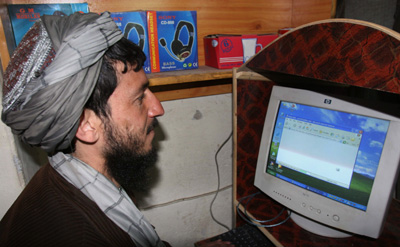Until recently, Afghanistan’s Internet has been notably free of government censorship. That stems largely from the limited impact and visibility of the Net domestically: The Taliban banned the Internet during its rule, and despite a recent boom in use, the nation has only a million users out of a population of about 29 million. But the Afghan government finally got around to imposing national filters in June, when the Ministry of Communications instructed local ISPs to blacklist websites that promote alcohol, gambling, and pornography, or ones that provide dating and social networking services.
Afghanistan’s Internet regulators are still struggling to enforce their rules. Despite the order, the vast majority of sites violating the regulator’s code are still available. Even ostensibly blocked sites are easily viewable using straightforward proxies or circumvention software.
Yet the government has already been tempted to use the new Internet regulations for more than just defending public morals. Just three months after the introduction of the rules, the government told ISPs to include news reporting websites on their blacklists. The Wall Street Journal reported last week that the Pashto-language website Benawa had been blocked in the country after it incorrectly reported that the first vice president, Mohammed Qasim Fahim, had died. (The site corrected the error within a half hour.) The site is available on its U.S.-based servers, but Benawa‘s U.S.-based owner and manager Khalid Hadi told CPJ: “Our site is now banned on 97 percent of ISP servers in Afghanistan, and the Afghan government says the ban will stay indefinitely.” Understandably, Hadi is angry about being pushed off Afghan servers.
There are also reports that a ban is being sought for another Pashto news site, Tolafghan.
That Internet censorship spreads beyond its initial targets should not come as a surprise. And monitoring Internet censorship poses unique problems. Unlike blacklists of books or individuals, blacklists of websites are rarely published, because providing such a list is assumed to effectively give citizens a roadmap for bypassing the flimsy defenses of a national firewall. And without such a transparent list of who is being blocked, public oversight is difficult, even in countries with strong rule of law.
Meanwhile administrations concerned by the reporting of a free press will, as apparently they did in Afghanistan, reach for filtering technology as a weapon in silencing critical voices online. Independent media aren’t the only ones who find themselves at risk. This week, The New York Times reported that after years of blocking news sites and social networking forums, Iran has begun blocking the websites of domestic prominent clerics.
Online and off, journalists are among the first to be censored. But they are rarely the last.
